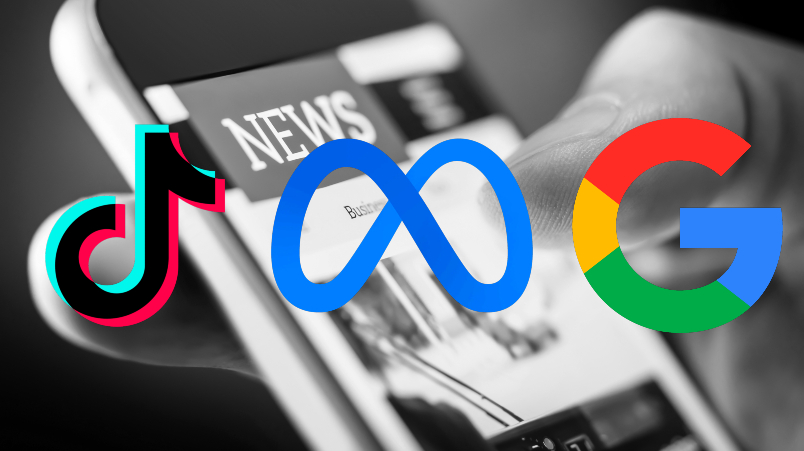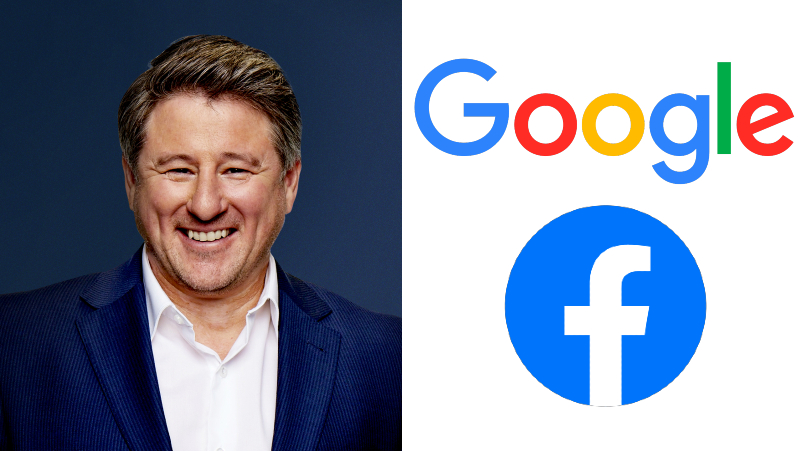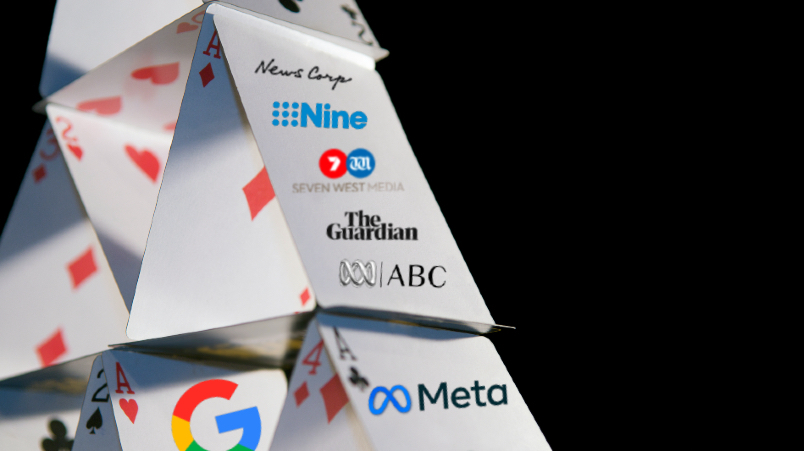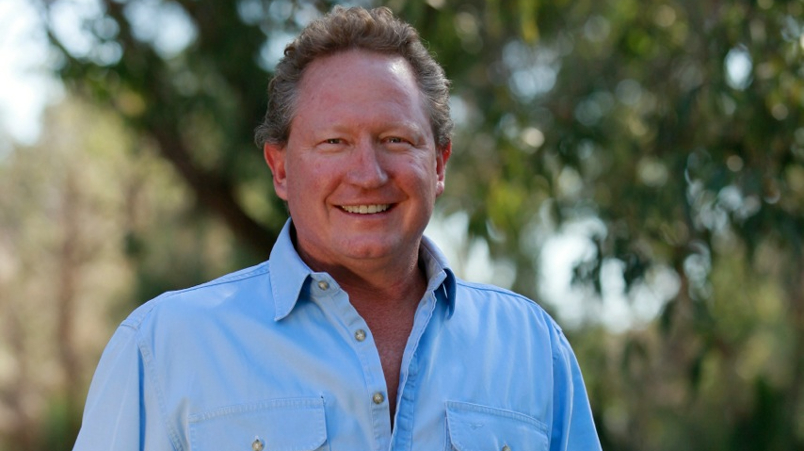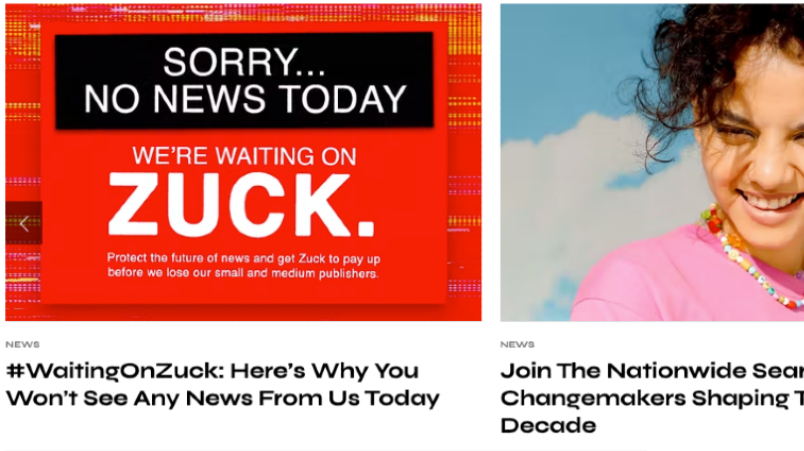As Feds pull Facebook spend, brands weigh options, marketers, publishers shift back to owned channels
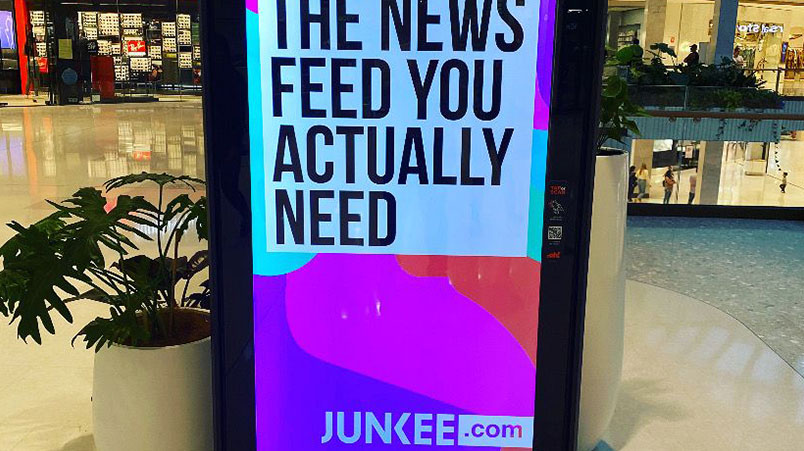
Like many publishers grappling with the fallout from Facebook's nuclear option, Junkee has taken to other channels
Facebook's news and broader content cull has some brands pulling spend, and others in fear of a public backlash. Both brands and publishers are now weighing up diversification strategies to channels they can control; email, newsletters and owned websites are the early winners. Meanwhile, agency bosses and public affairs veterans believe Facebook has made a strategic blunder that will backfire globally.
What you need to know:
- Agency bosses say big brands fear public backlash, with “high probability” they will pull spend if fallout grows.
- Some smaller brands already pulling.
- Marketers and nonprofits working on diversification away from Facebook.
- Email and owned channels early winners.
- Government affairs veteran says regulatory fallout will be global for Facebook.
More finger than thumb
“It was a big show of power,” said Kia’s head of marketing, Dean Norbiato. “My first response was shock and how immediate it was. This could have far reaching implications or it could be a blip. We need to analyse all that and we are. But it would be unAustralian if you did not see the impact of Facebook’s power – and that Facebook reminded us of that.”
Still, Kia will remain spending on Facebook for now. “We will be led by consumers,” says Norbiato. “If they’re falling off on metrics on that platform and there’s the emergence of positive attributes on another platform then absolutely we will shift spend. Facebook will still play a role for us. It’s crucial for driving traffic to our home pages.”
Norbiato says the immediate impact for Kia was with publishing partners on Facebook like Nine’s Carsguide, which was dumped in the Facebook show of might last week. “We’ll just have to reassess,” Norbiato said.
You don’t want to be the brand seen to be aiding and abetting a company that is very quickly being positioned as 'anti-democratic'. So how this plays out over the next week is critical.
Will brands pull spend?
Now Finance Minister Simon Birmingham has confirmed government will freeze its Facebook media spend, some $20m annually, will other big brands follow suite?
UM's Chief Digital Officer and Global Brand Safety Officer, Joshua Lowcock, says that is the only way advertisers can drive change.
"Privately expressing frustration at issues such as media pricing, content moderation decisions (or lack thereof) by platforms, or imbalances of market power can only be fixed if we invest our media budgets in a way that fosters market competition," he told Campaign Asia.
"Otherwise, as advertisers and agencies, we will be left with regulators asking us what role our decisions made in consolidating power in the hands of a few."
The AANA, which represents big advertisers, said the situation remains fluid, with brands working through implications.
Nick Keenan, CEO at Starcom Australia, said there was “a high level of anxiety last week” from clients concerned with risk to their reputation should they be seen to be advertising on a platform facing a highly emotive backlash.
Keenan thinks the fact that Facebook couldn’t separate news sites from non-news sites shows the difficulties it faces in trying to continue its approach.
So far, none of Starcom’s clients have pulled spend from the platform. But if there is concerted fallout, then he thinks there is “a high probability” that brands will take flight.
“It all depends on the level of risk. If the backlash is muted, risk declines. At the end of the day, Facebook is [usually] good for business.”
But if there is a genuine recoil, “you don’t want to be the brand seen to be aiding and abetting a company that is very quickly being positioned as ‘anti-democratic’.”
“So how this plays out over this week is critical to that equation.”
Ultimately, he thinks, “Facebook’s own brand will be the biggest loser”.
What this has reminded us is that Facebook is a channel. It is not a home.
Small brands freezing investment
Smaller brands are already starting to halt spend, according to John Vlasakakis, head of organic search at Melbourne-based performance agency Next & Co.
“I was surprised how quickly they did so,” he said.
While only a handful of Next & Co clients have so far paused Facebook spending “it’s the more notable clients” added Vlasakakis. “If they maintained the spend pull, it would represent approximately $2m a year.”
He thinks failure to quickly resolve the stand off could create a “snowball effect” once larger advertisers pull back from the platform.
Another performance agency, Sydney-based Indago Digital, has yet to see any impact.
“So far we’ve had no clients ask to pull their Facebook advertising,” said MD Gary Nissim. “I don’t see that changing and I don’t believe the average consumer will stop using the platform, though there is a chance a small percentage will.” Regardless, said Nissim, “our belief is that Facebook will continue to see a decline in its performance for our clients”.
The upshot for marketers: Diversification
David Leahy, head of marketing communications at the Juvenile Diabetes Research Foundation, woke up last Thursday to find the foundation’s Facebook page was down.
By Monday it was back up – but Leahy says the incident will have a lasting impact on its marketing strategy. The foundation will now diversify both its spend and resource allocation.
The foundation has traditionally lent heavily on Facebook to help its fundraising efforts, and used Facebook’s network effects to amplify the efforts of individual fundraisers – and that aspect is still affected by Facebook’s news cull, says Leahy, which will have a commercial impact.
Despite the pain, the foundation will still use Facebook, but will reduce its dependency.
“Given we have a niche audience – people who are interested in and connected to type one diabetes – and we're not for profit, there isn't another channel that lets us reach those people as effectively, and if I am honest, as cheaply,” Leahy told a panel convened on Monday by the Public Relations Institute of Australia.
“But what this has reminded us is that Facebook is a channel. It is not a home; it is not a hub,” said Leahy.
“We probably slipped into a bit of inertia in terms of where we placed Facebook. That will definitely be something we will consider with our budget for future fundraising and advocacy campaigns, for sure.”
As such, the foundation will “absolutely” diversify media spend, he added, and place more resource into channels that it can control.
“Social has been quite a good direct fundraiser for us. But what we're going to try and do now is use it a bit higher up the funnel and direct people into other channels, be it EDM, individual relationship management, and other pieces,” said Leahy.
“So we're still using that audience, but ensuring that the data and the longer term relationship is something that we have a stronger connection to.”
Publishers see newsletter boom
It’s the same story for publishers which are now scrambling to refocus on the channels they can control like email and websites.
Independent entertainment publisher Broadsheet has started promoting sign-ups to email newsletters and website to readers as its Facebook shutdown bites. It reads: "Bye, bye Facebook. By now you’ll have heard that the platform has blocked all Australian publishers, including Broadsheet, from posting to the newsfeed. We’re okay with it. We much prefer talking to you directly, without a gatekeeper controlling what you do and don’t see from us."
Junkee has done likewise with an ad campaign while the CEO of Nine’s Pedestrian Group, Matt Rowley, says he’s seen a 300% increase in subscriptions across its network of newsletters and alternate social channels as users “happily find Facebook-free alternatives to consuming content they know and love".
"Beyond the bluster and indignation of a monopoly whose sweet ruse has been put in check," said Rowley, "there’s an equitable solution staring everyone in the face."
They have put a massive target on themselves. They've actually increased the stakes of the Australian debate and the Australian outcome.
Public affairs: A strategic blunder that will cost Facebook globally
Facebook has made a monumental miscalculation that now eclipses whether or not its argument about the code is valid, according to public and government affairs specialist Nick Campbell, CEO at Nexas Apac Group. The former government adviser thinks it will have global ramifications.
“[The legislation] hasn’t yet passed the senate. They really jumped the gun. Looking at it from a Facebook headquarters perspective, if you are trying to minimise the chances of these types of actions happening not only here but around the world, there has now been global media about the Morrison government's actions in relation to this issue,” he told a panel convened on Monday by the Public Relations Institute of Australia. “So all the other politicians and regulators around the world are now looking at this case.
“So forget the argument, but the actions of Facebook and the way that they've gone out and upset quite a few of their customers without notice, without communicating to them, and then their stakeholders and importantly, in this context, their regulator. They have put a massive target on themselves. They've actually increased the stakes of the Australian debate and the Australian outcome.
“From a strategic communications perspective, and a government relations perspective and a public policy perspective, most observers would think this was an own goal,” said Campbell.
“This was this was ‘unfriending’ a lot of stakeholders at the wrong point in time without necessarily thinking it through all the way.”




